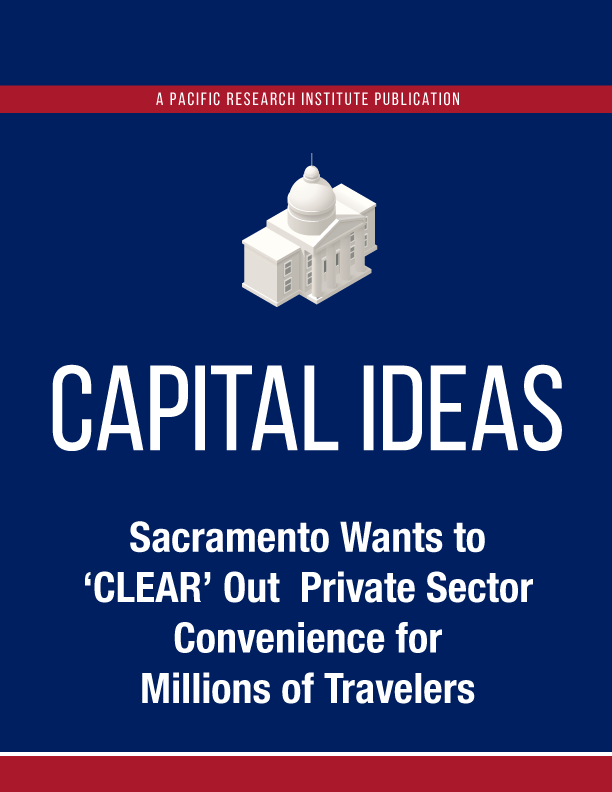California lawmakers want to run a business out of the state. What did this company do to deserve such a penalty? Is it connected to organized crime? Did it steal clients and customers? Does it traffic in contraband? No, it simply doesn’t fit with the political class’ sense of equity.
The business is CLEAR, which operates at nine California airports. For a modest fee, CLEAR steers passengers around one of the federal security theater chokepoints. Rather than having to wait in the document confirmation line, CLEAR members are ushered directly to the security gridlock after their identities have been verified by biometric scans.
Members can also enjoy expedited entries at entertainment and sports venues. The cost: $189 a year.
This isn’t acceptable to Sacramento’s equity warriors.
A statement from the office of Democratic Sen. Josh Newman, who introduced Senate Bill 1372, complains that CLEAR members’ privilege are an “inconvenience and annoyance” to “travelers making their way through the security queue.”
Newman insists that “despite what some have said,” his bill “doesn’t seek to terminate the CLEAR concierge service at California airports.” Instead, it simply requires “CLEAR and other third-party screening services operate separate lines for subscribers, eliminating the friction and frustration created by the current system.”
But that doesn’t square a statement he sent to the media.
“When it comes to making one’s way through airport security,” he said, “the quality of that experience shouldn’t be contingent on a traveler’s income or willingness to pay.” That sounds like a statement that would please Karl Marx. It also ignores that TSA PreCheck, which expedites screening for fliers who have the “income or willingness to pay,” also has a cost. But that’s apparently OK because the Transportation Security Administration is a government agency.
The bill doesn’t mention CLEAR by name. In generic language, it “would prohibit a public airport that provides commercial services,” beginning next year, from entering into new agreements with private third-party vendors that provide “expedited security screening to use the standard security lane or the Transportation Security Administration PreCheck security lane.”
It says nothing about how the third-party screening services are to “operate separate lines for subscribers,” though. Are they expected to expand at their own expense to accommodate these separate lines? Screening companies already lease space from airports for their operations. Requiring them to lease additional space could force them to raise rates to remain profitable, or they just might pack up and leave California.
At some airports, it might not be possible to add “additional lines and lanes for CLEAR or other third-party security,” says the Senate Transportation Committee Digest. “Most airports were designed prior to the 9/11 attacks and therefore” don’t have “dedicated space for security screening.”
We don’t imagine that Newman hasn’t considered these matters though he swears his bill isn’t an effort to chase CLEAR and others from California. Even the Senate Committee digest contemplates the possibility of the service being “phased out at airports.”
Newman further muddles affairs when he claims that “CLEAR has in recent years been the source of numerous security violations.” While that might be true, the government’s security record is by no means stellar.
Melvin Carrawa, acting TSA administrator, was reassigned in 2015 after an internal investigation showed how porous the system was. Undercover agents posing as passengers had been able to sneak firearms and bombs past TSA agents in 67 out of 70 tests. And it wasn’t the first time. At that point, the failures had been occurring for 13 years.
Two years later, performance improved. But not by much. The failure rate was in the “ballpark” of 80%.
All humans fail at some time. Yet it is widely assumed that government workers fail less than those in private sector, even though there is no evidence that as a group they are better trained, more motivated and have a greater aptitude. It’s not hard to find an argument that says government employees are actually less capable than their private-sector counterparts.
In another government-is-better assertion, Newman “contends that cutting TSA lines is different” than Southwest customers upgrading their boarding positions and Disney guests buying passes that let them skip some lines “because the TSA is a government service, not a private service.” That’s a statement of fact, not a compelling justification for passing his bill.
The trail of companies leaving California already looks like ants rushing to a picnic. Apparently forcing out one more to satisfy the equity mob is just the price of doing political business in Sacramento.
Kerry Jackson is the William Clement Fellow in California Reform at the Pacific Research Institute.

